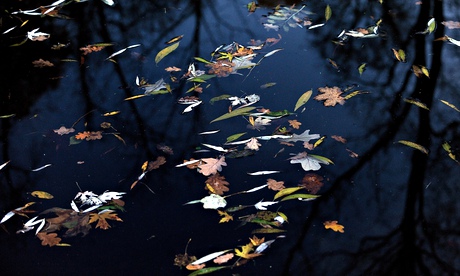The quiet pastoral of a river scene carries strong undercurrents of traumatic historical memory

'The river slinks like oil' … autumn leaves float on the water of the Vltava river in Prague. Photograph: Filip Singer/EPA
A footnote to this week's poem by Lotte Kramer (published in The Rialto, No. 80, Spring-Summer 2014) tells us that the poet "is a survivor of that small exodus of children organised by the kindertransport movement in the 1930s".
Kramer was born in Mainz in 1923, and now lives in Peterborough. She has said elsewhere that there are three rivers she lays claim to, the Rhine, the Thames and the Nene. Perhaps currents from all three intermingle in Silence. Another earlier poem, Bilingual describes the sea as "liquid memory" a phrase which suggests a fourth, subterranean river in Silence. This memory-river flows from the first word, "Today", to the remoter distances of the second stanza: "I left them in their blinding talk … " Deictic terms like "Here" and "Now" turn out to be rather more transitory as foot-holds than they first appear.
More
Kramer was born in Mainz in 1923, and now lives in Peterborough. She has said elsewhere that there are three rivers she lays claim to, the Rhine, the Thames and the Nene. Perhaps currents from all three intermingle in Silence. Another earlier poem, Bilingual describes the sea as "liquid memory" a phrase which suggests a fourth, subterranean river in Silence. This memory-river flows from the first word, "Today", to the remoter distances of the second stanza: "I left them in their blinding talk … " Deictic terms like "Here" and "Now" turn out to be rather more transitory as foot-holds than they first appear.
More
No comments:
Post a Comment